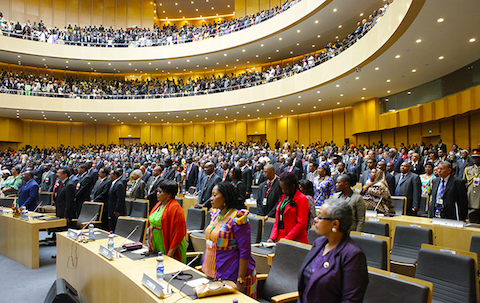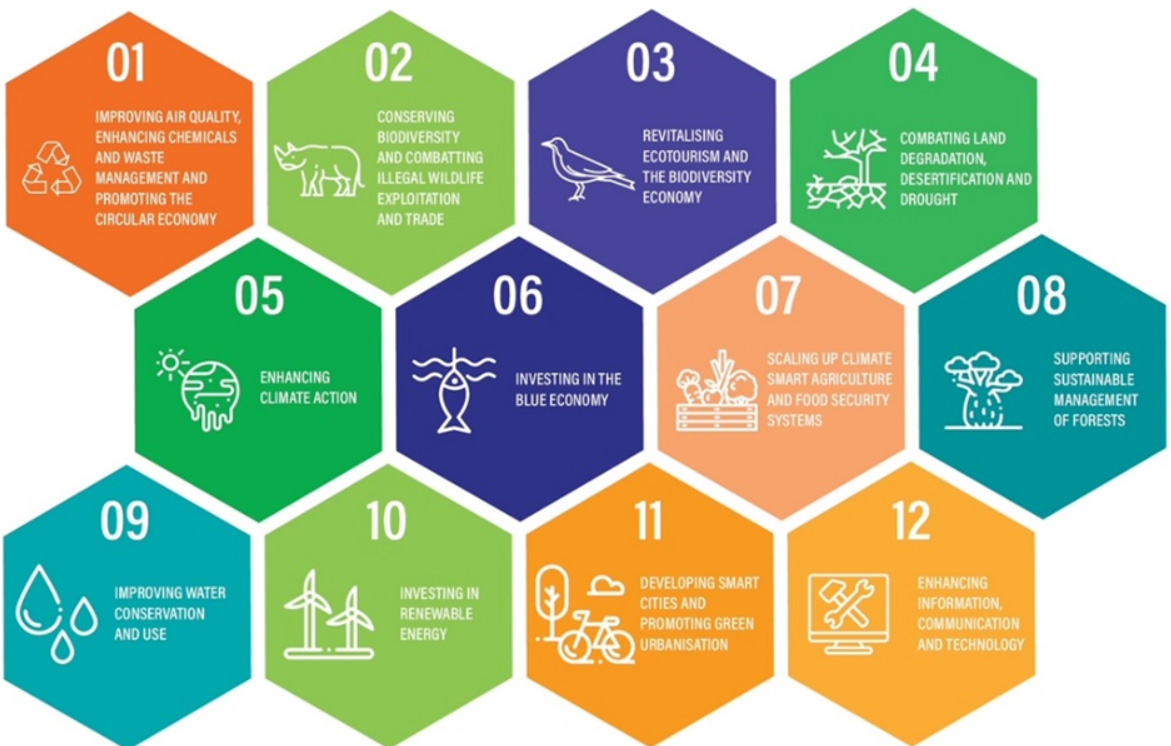Skip to main content
PRINCIPAUX DOMAINES PRIORITAIRES DE L’AGSP


- Improving Air Quality, enhancing Chemicals and Waste Management and promoting the Circular Economy–improving air quality as well as waste management, including marine litter and pollution,are priorities for Africa and managing additional chemicals and medical waste consistent with the circular economy has significant potential to improve the way in which goods and services are produced and consumed, reduce waste, create jobs, empower women, mobilize the youth and contribute to sustainable development.
- Conserving Biodiversity and Combatting the Illegal Wildlife Exploitation and Trade - addressing the threats facing Africa’s biological resources,including alien invasive species management is critical.There is an urgent need to combat illegal and unregulated wildlife exploitation and trade considering that the COVID-19 Pandemic’s origins and understanding the transfer of the virus from wildlife to humans to prevent similar future zoonotic transmission of diseases.
- Revitalising Eco-tourism and the Biodiversity Economy - the tourism industry globally has been hit hard by COVID-19 and Africa’s ecotourism sector has been especially negatively impacted. Environmentally and socially responsible tourism that promotes conservation of biodiversity and natural heritage, needs to be revitalized. Furthermore, the biodiversity economy has direct linkages to ecotourism and has also been negatively affected by the pandemic.The rejuvenation of ecotourism could contribute significantly to the continent’s recovery.
- Combating Land Degradation, Desertification and Drought - the populations and ecosystems in Africa’s dry lands are some of the most vulnerable to human-induced and natural shocks due to a range of socio-economic and environmental factors. Enhanced commitment to providing adequate resources to address the drivers of desertification, land degradation and drought are required.
- Enhancing Climate Action - scaled up, new and additional and appropriate financial resources and investment in large-scale transformative projects are urgently required to support the implementation of Africa’s Climate Change programmes. African countries in updating their Nationally Determined Contributions(NDCs) to the Paris Agreement, should highlight the economic sectors with greatest potential for green recovery and job creation, which can rebound and develop sustainably through international investment and financial, technological and capacity building support. African countries need to also invest in Multi-Hazard Early Warning Systems and strengthen the provision of accurate and timely climate and weather information.
- Investing in the Blue Economy - the need to enhance the environmental contribution to the development of the blue economy of Africa, as well as to mitigate the impacts of natural disasters such as floods and cyclones is imperative, as well as contributing to the livelihoods of people living in coastal and riparian areas. Harnessing the potential for improving productivity of the ocean environment, job creation, strengthening food and nutritional security, wealth creation opportunities and environmental sustainability towards sustainable blue economy development is also required.
- Scaling up Climate Smart Agriculture and Food Security Systems – Africa’s agricultural programmes for adaptation to climate change and building the resilience of farmers to climate related and economic shocks require additional support, including scaling up climate smart agriculture to enhance food security and agricultural livelihoods.
- Supporting Sustainable Management of Forests - support for African countries to achieve significant reduction in deforestation rates, while enhancing agricultural productivity, biodiversity conservation, sustainable management of natural resources and income of small-scale food and forest producers is required. Improved cross-sectoral collaboration in the fields of forestry, wildlife, agriculture, livestock, water, energy, tourism, and address issues related to the human-wildlife-livestock-ecosystem interface and sustainable value chain development is needed.
- Improving Water Conservation and Use – enhancing the equitable and sustainable use of Africa’s water resources for socioeconomic development through investing in improving management of water resources, such as river basin catchments, impoundments and lakes, enhancing water use efficiency as well as rain water harvesting and the modernization of irrigation systems to more water efficient systems is required.
- Investing in Renewable Energy - enhancing the roll-out of Renewable Energy initiatives is required to provide sufficient support to enable African countries to take bold action to leapfrog to the smart, people-centered renewable energy and energy efficient systems as well as value chains in terms of new and emerging markets and job creation. Investments in renewable energy and a diversified energy mix could as well shield African economies from future pandemics and economic crises.
- Developing Smart Cities and promoting Green Urbanisation - as Africa is rapidly urbanizing, there is a need to develop African sustainable urban models.The development of Smart Green Cities should support the incorporation of appropriate technology, ecological services and culture in urban models. This should result in increases in transaction efficiencies, improved transportation and mobility, deepening internet access and e-commerce; decent realization of distributed renew able energy; and the emergence of new services.
- Enhancing Information, Communication and Technology (ICT) - lessons learnt from COVID-19 have revealed gaps in the ICT systems, bandwidth and data access which has implications for Africa’s transition to the fourth industrial revolution(4IR). This needs to be addressed, with additional investments in ICT infrastructure in Africa to fully and effectively engage with rest of the world in the digital era.






